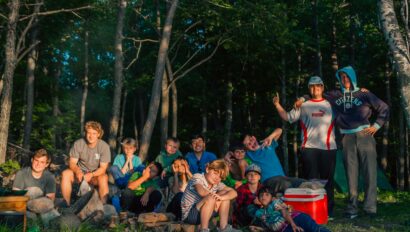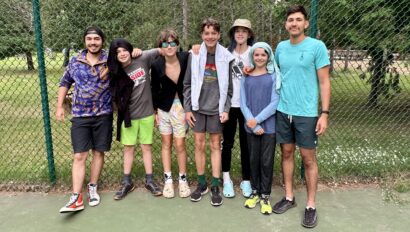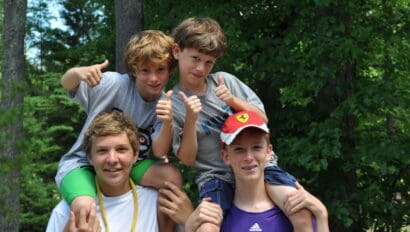When thinking about how much water is left in a glass, we arrive at the age-old conundrum. Is it half-full? Or half-empty? As we move into the third chapter of Happy Campers, Audrey Monke explains the necessity of optimism in our lives, at camp and at home.
“We need to care about whether our camps, schools, and families are positive, and whether our kids are learning to be optimistic, because a more optimistic outlook predicts success in many areas including health, happiness, and relationships.” -Audrey Monke, Happy Campers
 What is optimism? Optimism is a mindset of viewing problems as short-term and fixable, and it manifests itself as being willing to try again. Optimists try again. Optimists forgive others, and themselves. Optimists see the rain coming in across the lake, and instead of picturing wet boots, they see adventure and challenge and opportunity. Optimists sing into the storm, and lift the spirits of those around them.
What is optimism? Optimism is a mindset of viewing problems as short-term and fixable, and it manifests itself as being willing to try again. Optimists try again. Optimists forgive others, and themselves. Optimists see the rain coming in across the lake, and instead of picturing wet boots, they see adventure and challenge and opportunity. Optimists sing into the storm, and lift the spirits of those around them.Monke goes on to explain that living with an optimistic mindset does much more than allow us to feel cheery in tough circumstances. It also has very real effects on the way we develop. Monke cites the research of psychologist Barbara Fredrickson, who explains that living with an optimistic outlook allows kids to grow cognitive, psychological, social and physical resources. Things like being present, feeling at peace, being emotionally supporting and supported, and even recovering from an illness are all resources that are developed through an optimistic lifestyle.
“What we learned was that in most cases, these negative people didn’t perceive themselves as negative or see the impact they were having on others. Instead, they view outside forces as the source of their negativity. They thought it was their supervisor, or their circumstances, or their challenging campers that were causing their negative behaviors, and that their negative attitude was out of their control.”
So we know that optimism is important. How then, does a summer at Camp Chippewa provide all of these positive benefits to our campers? First of all, campers are outside, surrounded by friends, and away from technology. Author Richard Louv has written extensively about “Nature Defecit Disorder,” a side effect of the further separation of our species from nature. One of Monke’s positivity practices is simply spending time outside, and for good reason. Benefits from spending time outside include “providing stress relief, promoting better sleep, boosting brain health, and decreasing anxiety and depression.”

At Camp Chippewa, positivity is core to the daily life of a camper or staff member. While students may sometime complain about having to go to class, campers elect their daily activities, and get to go class. Thank yous are common place in the dining hall, and even the daily chores of inspection are laden with positivity in the form of team-building, and working toward being recognized as Honor Cabin. On the trail, campers are given the opportunity to practice optimism on a daily basis. This optimism is led by the staff and the group as a whole, and often manifests itself as resilience. I’m sure anyone who has been on a Canadian canoe trip can recall the comradery built around a fire during a rainstorm, or the joy and togetherness of paddling into a headwind, or even the accomplishment of completing a challenging portage, and then heading back down the trail to help the group. These are all the result of optimism. This optimism—the same one that is building so many skills and improving our quality of life—is present every day of camp, and is integral to the culture at Chippewa.

Stay tuned next month for Monke’s fourth chapter of Happy Campers, this one delving into independence!


